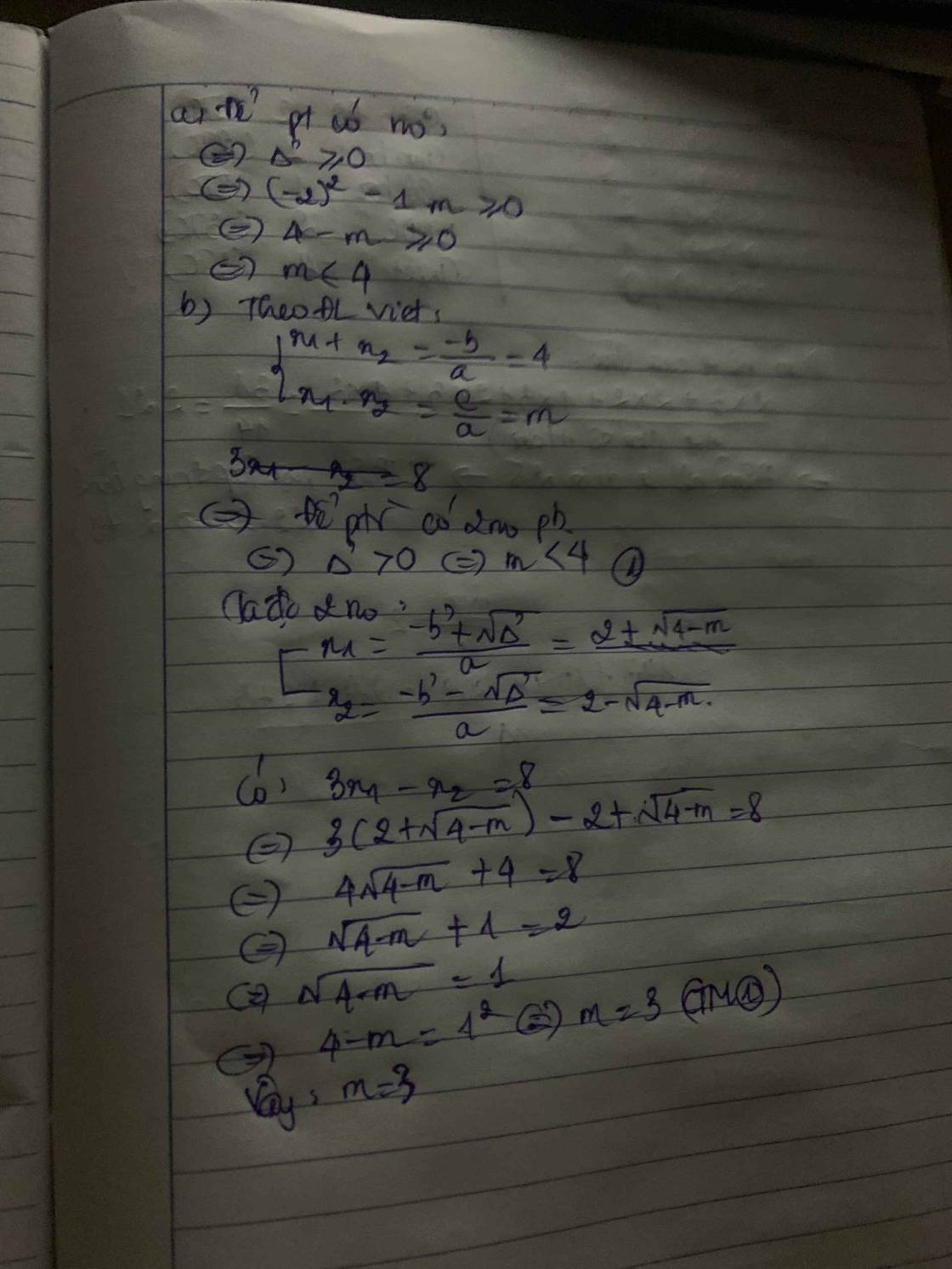Tìm nghiệm b(x)=4x-2
TH
Những câu hỏi liên quan
Tìm nghiệm của các đa thức sau
a) 4x+12 b) 5x-1/6 c) -6-2x
d)x^2+4x e)x^3-4x f)x^5-27x^2
a) \(4x+12=0\)
\(4x=-12\\ x=-3\)
Vậy \(x=-3\) là nghiệm của đa thức.
b) \(5x-\dfrac{1}{6}=0\)
\(5x=\dfrac{1}{6}\\ x=\dfrac{1}{30}\)
Vậy \(x=\dfrac{1}{30}\) là nghiệm đa thức.
c) \(-6-2x=0\)
\(2x=-6\\ x=-3\)
Vậy \(x=-3\) là nghiệm của đa thức.
d) \(x^2+4x=0\)
\(x\left(x+4\right)=0\)
TH1: \(x=0\)
TH2: \(x+4=0\) hay \(x=-4\)
Vậy các nghiệm của đa thức là \(x=0,x=-4\).
e) \(x^3-4x=0\)
\(x\left(x^2-4\right)=0\)
TH1: \(x=0\)
TH2: \(x^2-4=0\), suy ra \(x^2=4\), do đó \(x=2\) hoặc \(x=-2\)
Vậy các nghiệm của đa thức là \(x=0,x=2,x=-2\)
f) \(x^5-27x^2=0\)
\(x^2\left(x^3-27\right)=0\)
Th1: \(x^2=0\) hay \(x=0\)
TH2: \(x^3-27=0\), suy ra \(x^3=27\), hay \(x=3\)
Vậy \(x=0,x=3\) là các nghiệm của đa thức.
Đúng 4
Bình luận (0)
\(\text{a)Đặt 4x+12=0}\)
\(\Rightarrow4x=0-12=-12\)
\(\Rightarrow x=\left(-12\right):4=-3\)
\(\text{Vậy đa thức 4x+12 có nghiệm là x=-3}\)
\(\text{b)Đặt 5x-}\dfrac{1}{6}=0\)
\(\Rightarrow5x=0+\dfrac{1}{6}=\dfrac{1}{6}\)
\(\Rightarrow x=\dfrac{1}{6}:5=\dfrac{1}{30}\)
\(\text{Vậy đa thức 5x-}\dfrac{1}{6}\text{ có nghiệm là }x=\dfrac{1}{30}\)
\(\text{c)Đặt (-6)-2x=0}\)
\(\Rightarrow2x=\left(-6\right)-0=-6\)
\(\Rightarrow2x=\left(-6\right):2=-3\)
\(\text{Vậy đa thức (-6)-2x có nghiệm là x=-3}\)
\(\text{d)Đặt }x^2+4x=0\)
\(\Rightarrow x\left(x+4\right)=0\)
\(\Rightarrow\left[{}\begin{matrix}x=0\\x+4=0\Rightarrow x=0-4=-4\end{matrix}\right.\)
\(\text{Vậy đa thức }x^2+4x\text{ có 2 nghiệm là }x=0;x=-4\)
\(\text{e)Đặt }x^3-4x=0\)
\(\Rightarrow x\left(x^2-4\right)=0\)
\(\Rightarrow\left[{}\begin{matrix}x=0\\x^2-4=0\Rightarrow x^2=0+4=4\Rightarrow x=\pm2\end{matrix}\right.\)
\(\text{Vậy đa thức }x^3-4x\text{ có 3 nghiệm là }x=0;x=2;x=-2\)
\(\text{f)Đặt }x^5-27x^2=0\)
\(\Rightarrow x^2\left(x^3-27\right)=0\)
\(\Rightarrow\left[{}\begin{matrix}x^2=0\Rightarrow x=0\\x^3-27=0\Rightarrow x^3=0+27=27\Rightarrow x=3\end{matrix}\right.\)
\(\text{Vậy đa thức }x^5-27x^2\text{ có 2 nghiệm là }x=0;x=3\)
Đúng 1
Bình luận (0)
cho hai đa thức M(x)=-4x^3+ 5x-2 và N(x)=4x^3-3x+6
a) Tính P(x)=m(x)+N(x).
b) Tìm nghiệm của P(x)
c) Cho F(x)= 3^2-2x+ C có nghiệm x=2. Tìm giá trị của C
trả lời giùm tui câu C mọi người ơiiiii
`a)P(x)=M(x)+N(x)=-4x^3+5x-2+4x^3-3x+6`
`=2x+4`
`b)` Cho `P(x)=0`
`=>2x+4=0`
`=>2x=-4`
`=>x=-2`
Vậy nghiệm của `P(x)` là `x=-2`
`c)` Thay `x=2` vào `F(x)=0` có:
`3^2-2.2+C=0`
`=>9-4+C=0`
`=>5+C=0`
`=>C=-5`
Đúng 4
Bình luận (0)
c) F(x) có x = 2 là nghiệm
=> F(2) = 0 <=> 32 - 2.2 + C = 0 <=> 9 - 4 + C = 0 <=> 5 + C = 0 <=> C = -5
vậy C = -5
Đúng 2
Bình luận (0)
c ).
F(x) cs nghiệm
=> F(x) = 0
<=> \(3^2-2x+C=0\)
thay x = 2
ta được :
\(3^2-2.2+C=0\)
<=> \(9-4+C=0\)
<=> \(5+C=0\) = > C = -5
Đúng 2
Bình luận (0)
tìm nghiệm
b(x)=\(^{\left(-2x\right)^2}\) - 3x + 21 -\(4x^2\)
\(B\left(x\right)=0\)
\(\Rightarrow\left(-2x\right)^2-3x+21-4x^2=0\)
\(\Rightarrow4x^2-3x+21-4x^2=0\)
\(\Rightarrow-3x+21=0\)
\(\Rightarrow-3x=-21\)
\(\Rightarrow x=\dfrac{21}{3}\)
\(\Rightarrow x=7\)
Đúng 3
Bình luận (0)
tìm ngiệm A(x)=x^3+3^2-4x B(x)=-2x^3+3^2+4x+1
Chứng tỏ rằng x=0 là nghiệm của đa thức A(x) nhưng không là nghiệm của đa
thức B(x)
Bài làm:
Ta có: \(A\left(x\right)=x^3+3x^2-4x=x\left(x-1\right)\left(x+4\right)=0\)
\(\Rightarrow\hept{\begin{cases}x=0\\x-1=0\\x+4=0\end{cases}}\Leftrightarrow\hept{\begin{cases}x=0\\x=1\\x=-4\end{cases}}\)là nghiệm của A(x)
Vậy x = 0 là nghiêm của A(x)
Mà tại x = 0 thì giá trị của B(x) là:
\(B\left(0\right)=-2.0^3+3.0^2+4.0+1=1\)
=> x = 0 không là nghiệm của B(x)
Bạn viết đề rõ hơn được không ạ ?
Lp 7 cái phương trình bậc 3 kia, bấm máy ra số vô tỉ
Cái j mà x = 0 là nghiệm đa thức A ? logic nhỉ !
Xem thêm câu trả lời
cho phương trình \(m^2\)x +6= 4x+3m a) giải pt khi m=3 b) tìm m để pt có nghiệm x= 1,5 c) tìm m để pt có nghiệm vô nghiệm vô số nghiệm d) tìm m nguyên để pt trên có nghiệm
a) Thay m=3 vào pt ta được:
\(9x+6=4x+9\Leftrightarrow x=\dfrac{3}{5}\)
Vậy...
b) Thay x=-1,5 vào pt ta được:
\(m^2\left(-1,5\right)+6=4.\left(-1,5\right)+3m\)
\(\Leftrightarrow\dfrac{-3}{2}m^2-3m+12=0\)\(\Leftrightarrow\left[{}\begin{matrix}m=2\\m=-4\end{matrix}\right.\)
Vậy...
c)Pt \(\Leftrightarrow x\left(m^2-4\right)=3m-6\)
Để pt vô nghiệm \(\Leftrightarrow\left\{{}\begin{matrix}3m-6\ne0\\m^2-4=0\end{matrix}\right.\)\(\Leftrightarrow\left\{{}\begin{matrix}m\ne2\\m=\pm2\end{matrix}\right.\)\(\Rightarrow m=-2\)
Để pt có vô số nghiệm \(\Leftrightarrow\left\{{}\begin{matrix}3m-6=0\\m^2-4=0\end{matrix}\right.\)\(\Leftrightarrow\left\{{}\begin{matrix}m=2\\m=\pm2\end{matrix}\right.\)\(\Rightarrow m=2\)
d)Để pt có nghiệm \(\Leftrightarrow m^2-4\ne0\Leftrightarrow m\ne\pm2\)
\(\Rightarrow x=\dfrac{3m-6}{m^2-4}=\dfrac{3\left(m-2\right)}{\left(m-2\right)\left(m+2\right)}=\dfrac{3}{m+2}\)
Để \(x\in Z\Leftrightarrow\dfrac{3}{m+2}\in Z\)
Vì \(m\in Z\Leftrightarrow m+2\in Z\).Để \(\dfrac{3}{m+2}\in Z\Leftrightarrow m+2\inƯ\left(3\right)=\left\{-1;-3;1;3\right\}\)
\(\Leftrightarrow m=\left\{-3;-5;-1;1\right\}\) (tm)
Vậy...
Đúng 3
Bình luận (0)
Cho pt x^2-4x+m=0 a)tìm m để pt có nghiệm b)tìm m để pt có nghiệm thỏa 3x1-x2=8
bài9: chứng tỏ các đa thức sau ko có nghiệm
b) x^2 - 5x + 31
c-x^2 - 12x - 45
d) x^2 - 4x + 26
bài4:tìm nghiệm của đa thức sau
d) x^3 - 19x^2
b.
Đặt \(f\left(x\right)=x^2-5x+51=x^2-5x+\dfrac{25}{4}+\dfrac{37}{2}=\left(x-\dfrac{5}{2}\right)^2+\dfrac{37}{2}\)
Do \(\left(x-\dfrac{5}{2}\right)^2\ge0;\forall x\Rightarrow\left(x-\dfrac{5}{2}\right)^2+\dfrac{37}{2}\ge\dfrac{37}{2}\) ;\(\forall x\)
\(\Rightarrow\) Đa thức \(f\left(x\right)\) không có nghiệm
c.
Đặt \(g\left(x\right)=-x^2-6x-45=-\left(x^2+6x+9\right)-36=-\left(x+3\right)^2-36\)
Do \(-\left(x+3\right)^2\le0;\forall x\Rightarrow-\left(x+3\right)^2-36\le-36\) ;\(\forall x\)
\(\Rightarrow\) Đa thức \(g\left(x\right)\) không có nghiệm
d.
Đặt \(h\left(x\right)=x^2-4x+26=\left(x^2-4x+4\right)+22=\left(x-2\right)^2+22\)
Do \(\left(x-2\right)^2\ge0;\forall x\Rightarrow\left(x-2\right)^2+22\ge22\) ;\(\forall x\)
\(\Rightarrow\) Đa thức \(h\left(x\right)\) không có nghiệm
4.
d. \(x^3-19x^2=0\)
\(\Leftrightarrow x^2\left(x-19\right)=0\)
\(\Leftrightarrow\left[{}\begin{matrix}x^2=0\\x-19=0\end{matrix}\right.\)
\(\Leftrightarrow\left[{}\begin{matrix}x=0\\x=19\end{matrix}\right.\)
Vậy đa thức có 2 nghiệm là \(x=0;x=19\)
Đúng 1
Bình luận (0)
tìm nghiệm của:
a) x^2 - x
b) 3x^2 - 4x
a) Cho da thức = 0 ta có
x2 - x = 0
=> x2 = 0 và x = 0
=> x = 0
b ) 3x2 - 4x = 0
=> 3x2 = 0 hoặc 4x = 0
=> x2 = 02 hoặc x = 0
=> x = 0
Đúng 0
Bình luận (0)
a)x4+3/5 - 6x-2/7 5x+4/3 +3b) x-3/x-2 + x-2/x-4 3.1/5c)3/1-4x 2/4x+1 - 8+6x/16x^2-1d) x+1/x - x+5/x-2 1/x^2 - 2xbài 2: a)Tìm m để phương trình 3x+m x.4 nhận x-2 là nghiệm b)Tìm m để phương trình (2x+1)(9x+2k)-5(x+2)40 có nghiệm x2c)Tìm m để phương trình 2mx-34x có nghiệmd)Tìm m để phương trình mx2-x vô nghiệm e)Tìm a và b để phương trình a(2x3)x+b có nghiệm , cô nghiệm, vô số nghiệm
Đọc tiếp
a)x4+3/5 - 6x-2/7 = 5x+4/3 +3
b) x-3/x-2 + x-2/x-4 = 3.1/5
c)3/1-4x = 2/4x+1 - 8+6x/16x^2-1
d) x+1/x - x+5/x-2 = 1/x^2 - 2x
bài 2:
a)Tìm m để phương trình 3x+m = x.4 nhận x=-2 là nghiệm
b)Tìm m để phương trình (2x+1)(9x+2k)-5(x+2)=40 có nghiệm x=2
c)Tìm m để phương trình 2mx-3=4x có nghiệm
d)Tìm m để phương trình mx=2-x vô nghiệm
e)Tìm a và b để phương trình a(2x=3)=x+b có nghiệm , cô nghiệm, vô số nghiệm
Bài 1:
c) ĐKXĐ: \(x\notin\left\{\dfrac{1}{4};-\dfrac{1}{4}\right\}\)
Ta có: \(\dfrac{3}{1-4x}=\dfrac{2}{4x+1}-\dfrac{8+6x}{16x^2-1}\)
\(\Leftrightarrow\dfrac{-3\left(4x+1\right)}{\left(4x-1\right)\left(4x+1\right)}=\dfrac{2\left(4x-1\right)}{\left(4x+1\right)\left(4x-1\right)}-\dfrac{6x+8}{\left(4x-1\right)\left(4x+1\right)}\)
Suy ra: \(-12x-3=8x-2-6x-8\)
\(\Leftrightarrow-12x-3-2x+10=0\)
\(\Leftrightarrow-14x+7=0\)
\(\Leftrightarrow-14x=-7\)
\(\Leftrightarrow x=\dfrac{1}{2}\)(nhận)
Vậy: \(S=\left\{\dfrac{1}{2}\right\}\)
Đúng 0
Bình luận (0)









